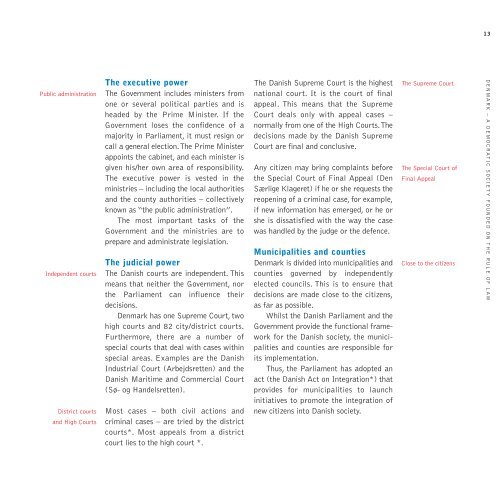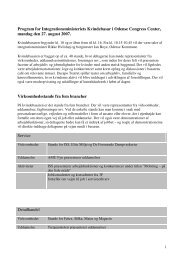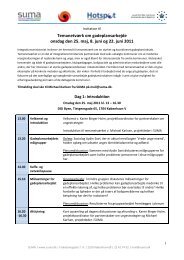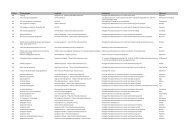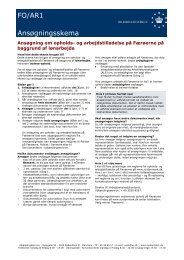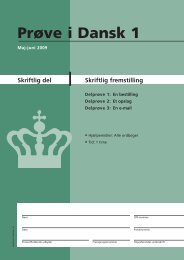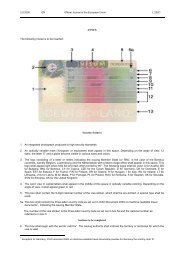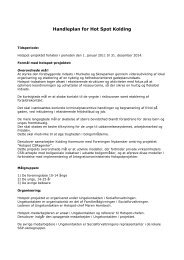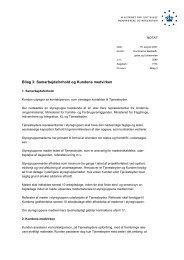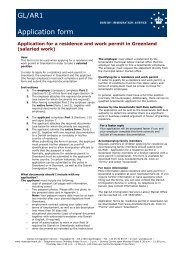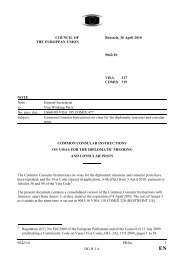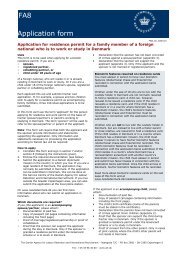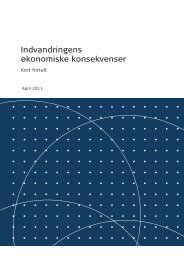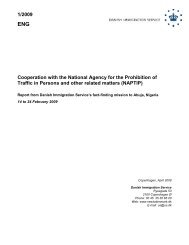medborger_i_danmark_engelsk.pdf - Ny i Danmark
medborger_i_danmark_engelsk.pdf - Ny i Danmark
medborger_i_danmark_engelsk.pdf - Ny i Danmark
- No tags were found...
You also want an ePaper? Increase the reach of your titles
YUMPU automatically turns print PDFs into web optimized ePapers that Google loves.
13Public administrationIndependent courtsDistrict courtsand High CourtsThe executive powerThe Government includes ministers fromone or several political parties and isheaded by the Prime Minister. If theGovernment loses the confidence of amajority in Parliament, it must resign orcall a general election.The Prime Ministerappoints the cabinet, and each minister isgiven his/her own area of responsibility.The executive power is vested in theministries – including the local authoritiesand the county authorities – collectivelyknown as “the public administration”.The most important tasks of theGovernment and the ministries are toprepare and administrate legislation.The judicial powerThe Danish courts are independent. Thismeans that neither the Government, northe Parliament can influence theirdecisions.Denmark has one Supreme Court, twohigh courts and 82 city/district courts.Furthermore, there are a number ofspecial courts that deal with cases withinspecial areas. Examples are the DanishIndustrial Court (Arbejdsretten) and theDanish Maritime and Commercial Court(Sø- og Handelsretten).Most cases – both civil actions andcriminal cases – are tried by the districtcourts*. Most appeals from a districtcourt lies to the high court *.The Danish Supreme Court is the highestnational court. It is the court of finalappeal. This means that the SupremeCourt deals only with appeal cases –normally from one of the High Courts.Thedecisions made by the Danish SupremeCourt are final and conclusive.Any citizen may bring complaints beforethe Special Court of Final Appeal (DenSærlige Klageret) if he or she requests thereopening of a criminal case, for example,if new information has emerged, or he orshe is dissatisfied with the way the casewas handled by the judge or the defence.Municipalities and countiesDenmark is divided into municipalities andcounties governed by independentlyelected councils. This is to ensure thatdecisions are made close to the citizens,as far as possible.Whilst the Danish Parliament and theGovernment provide the functional frameworkfor the Danish society, the municipalitiesand counties are responsible forits implementation.Thus, the Parliament has adopted anact (the Danish Act on Integration*) thatprovides for municipalities to launchinitiatives to promote the integration ofnew citizens into Danish society.The Supreme CourtThe Special Court ofFinal AppealClose to the citizensDENMARK – A DEMOCRATIC SOCIETY FOUNDED ON THE RULE OF LAW


